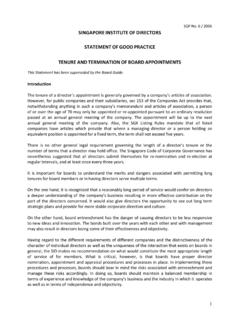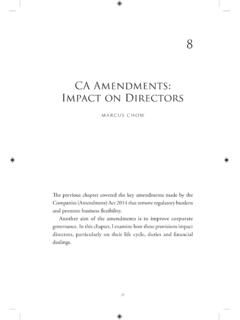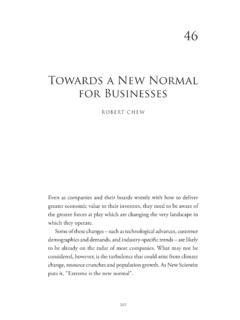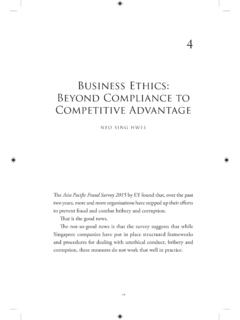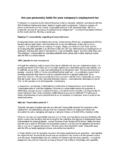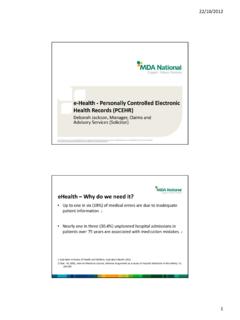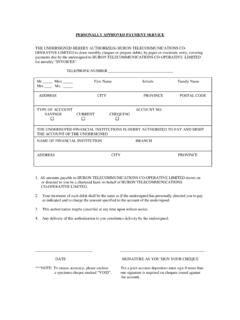Transcription of When Are Directors Personally liable for Corporate …
1 43. When Are Directors Personally liable for Corporate Debt? V ictor Yeo A key reason that companies are the preferred form to conduct business is that the personal assets of its shareholders and Directors are shielded from creditors in the event of a company's insolvency. This is because the company is treated as a separate legal entity from its Directors and shareholders, and it is this principle of limited liability that makes the Corporate vehicle such an attractive one. However, not many may be aware that there are circumstances in which Directors can be held Personally liable for the company's debts. For example, the law sometimes treats specific actions as being carried out by a company's controllers (which include its Directors ) and not the company, even where they are done in the company's name. 189. Boardroom Matters volume III.
2 When this occurs, the courts are said to have lifted or pierced the Corporate veil to hold Personally liable those behind the company's actions. Two instances when the Corporate veil can be pierced are: When the Corporate form and the limited liability that it provides are abused at the expense of third parties. Statutory provisions that impose liabilities on shareholders or Directors for the company's obligations. Fraud a n d s ham tra n sactions The clearest example of abuse is where the company is used as a vehicle for fraud. Section 340 of the Companies Act holds a person (including a director) who knowingly carries on the business of a company with the intent to defraud creditors Personally liable for any or all of the company's debts. A related situation occurs where the company is actually a fa ade that enables its shareholders to enter into sham transactions.
3 This may arise, for example, where a director arranges for sums to be paid to his company for services that he does not intend to provide and then pays the money to himself, and leaves an empty shell for the innocent party to sue. This occurred in the case, Children's Media Ltd and others v Singapore Tourism Board (2009). An individual (through a company and its subsidiary which he owned and controlled) received over S$6 million from the Singapore Tourism Board to organise a mega-event which, as it turned out, he never intended to stage. He was ordered by the court to Personally repay the sum even though it had originally been paid to the company which was the party to the contract. 190. When Are Directors Personally liable for Corporate Debt? Another example of the Corporate veil being lifted is where the company's controller is regarded as its alter-ego in that the company is actually carrying on his business.
4 This can arise where a company's majority shareholder treats the company's assets as if they were his own. In Alwie Handoyo v Tjong Very Sumito (2013), a company's sole director and shareholder was Personally liable for US$550,000. which the company unjustly received from another party. This was because the shareholder did not distinguish between himself and the company. Specifically, he claimed to be Personally entitled to sums owed to the company, and operated the company's bank accounts as if they were his own. It should be noted that the courts are generally reluctant to pierce the Corporate veil since the law gives parties the right to use the Corporate form to limit their risks and liabilities. However, it is important that Directors ensure that the separate legal personality of a company is not abused and used to evade the law, or else they risk facing personal liability for the company's obligations.
5 Other i n stances w he n s h are hol ders or Directors are l iabl e f or compan y ' s oblig ations There are two other occasions where the Companies Act imposes liabilities on shareholders and/or Directors for the company's obligations. First, Section 145(1) requires companies to have at least one director who is ordinarily resident in Singapore. Many foreign parties incorporate companies in Singapore and nominate individuals to sit on their boards mainly to meet this residency requirement. 191. Boardroom Matters volume III. It is important for the shareholders of these companies to note that, under Section 145(10), if a company carries on business without a director who is ordinarily resident in Singapore for more than six months, its shareholders who are aware of this fact may be made Personally liable for all debts incurred by the company after that six- month period for so long as there is no ordinarily resident director in Singapore appointed.
6 Second, Section 144(2) makes it an offence for any director or shareholder to issue or sign a bill of exchange, promissory note or other negotiable instrument on the company's behalf where its name is not mentioned in the document. In addition, the person who signs, issues or authorises the signing or issuance of the document can also be Personally liable if payment under the document is not eventually made. In summary, company Directors in Singapore should be aware that circumstances may arise under the Companies Act and common law in which the law allows the piercing or lifting of the Corporate veil so that the company's creditors can make claims against them Personally , and lay claim to their personal assets.. 192.
